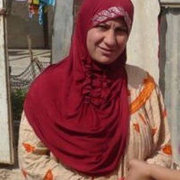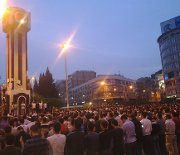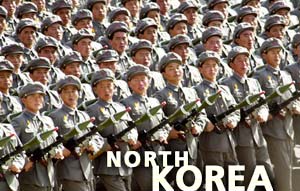“The same sufferings are experienced by your brotherhood in the world” (1 Peter 5).
Showing posts with label sanctions. Show all posts
Showing posts with label sanctions. Show all posts
Saturday, March 9, 2013
UN passes more sanctions again North Korea
North Korea (MNN) ― Following last month's nuclear test, North Korea is spewing new threats of a first-strike nuclear attack because it claims the United States is pushing to start a nuclear war against the country. This fiery rhetoric comes on the heels of the United Nation's approval of sweeping sanctions against the isolated nation.
Todd Nettleton with Voice of the Martyrs says, "These sanctions I think do have an effect because they do involve some commercial things and banking things and financial things; yes, they do have an effect. Is it something that's going to really change the direction of North Korea? It's hard to picture that happening."
While the sanctions may be meaningless for real change in North Korea, it does signal some change, says Nettleton. "It shows that China is perhaps losing patience with the North Korean regime. So these sanctions, and the fact that China cooperated with them, may be sending them a message."
Nettleton says Christians continue to face incredible oppression in a nation that's considered the worst place on earth to be a Christian. "Christians are sort of singled out for the worst persecution or the worst situations in North Korea. One of the things I like to tell people is that everyone in North Korea is oppressed, but the Christians are singled out for the very worst oppression."
Nettleton also says, "If they know you're a Christian they've already arrested you. If you're a Christian and the government finds out about it, you are arrested. You're taken to a concentration camp."
About the only thing Christians can do is pray. "Pray for a change in government that treats all of its people better: not only the Christians, but all of the people of North Korea. That's hard to imagine, but obviously we serve a God who can do amazing things."
Voice of the Martyrs is doing everything possible to encourage secret Christians, and they do it in unique ways: "Balloon launches that float over into North Korea and come down. That's a significant way of getting the Gospel message [into North Korea]. Actually, last year we were able to deliver 50,000 New Testaments."
Labels:
asia,
christians,
north korea,
nuclear,
persecution,
sanctions,
threats,
vom
Location:
North Korea
Friday, April 20, 2012
EU to temporarily lift Burma sanctions
Burma (MNN) ― At a meeting this coming Monday, the European Union is expected to suspend sanctions on Burma for one year.
According to VOA News, the EU has plans to suspend all sanctions except an arms embargo for the next 12 months. The Associated Press reports the potential for another review by the EU in six months.
"It's a great step, the way that the sanctions were lifted. So that it does encourage more change and more progress," says Dyann Romeijn with Vision Beyond Borders. "I think that the whole consensus is that they'd like to reward the steps that have been made, but also to recognize that the steps that have been made are not enough for the sanctions to be completely lifted and ended."
Violence in Burma has been on a steady decline as the nation has welcomed more and more democratic reform, including the addition of opposition leader Aung San Suu Kyi to parliament. Christians have been a particular target of genocide and other attacks in the past.
"There is still some violence and some persecution against Christians and some of the tribal groups, but even that is decreasing," notes Romeijn. "That needs to end for the sanctions to be completely lifted."
The world is watching now, and the Burmese government seems to be responding. Regardless of what happens, it will take generations for the Burmese people to heal from the oppressive, military rule they suffered under. Vision Beyond Borders remains cautious, but with the EU's close eye on Burma, change seems to be genuine.
Romeijn says the kind of turnaround exhibited in this next chapter of Burma's reform story can only be the result of years of fervent prayer.
"I truly believe that there's no other way this could happen," she says. "We've seen this kind of oppression in many other countries, and you don't see that peaceful transition, which is what people have been praying for."
Under the stipulations given for lifted sanctions, Burma will have to further decrease violence and increase rights.
Romeijn believes the church will soon be able to tell its story of persecution, but more importantly, the Gospel of Jesus Christ, across the nation.
Keep praying for Burma as they travel down this new road to democracy, perhaps even to Christ.
Labels:
aung san suu kyi,
Burma,
democracy,
European Union,
myanmar,
persecution,
reform,
sanctions,
vision beyond borders
Location:
Burma
Monday, March 19, 2012
Brutality in Syria creates humanitarian crisis
 |
| (Photos courtesy Christian Aid Mission) |
Syria (MNN/CAM) ― The crisis in Syria has created a flood of refugees. According to the United Nations, the number fleeing the regime's wrath has risen by several thousand in the past few days and now tops 34,000.
Their most recent numbers show that hundreds of thousands are thought to be displaced within Syria. Bill Bray with Christian Aid Mission says, "Almost every day, we're getting new reports of increasing numbers of refugees and increasing sacrifice being made by the Christian community in the surrounding countries to reach out."
Most of the poor refugees, made up of nominal Christian and other minorities, are fleeing to neighboring countries where the reception has been chilly. "They are trying to contain the refugee crisis, and displaced persons within Syria and not welcoming them across their borders. All the borders are mined and armed--protected. They don't want a huge rush of refugees from Syria coming into their countries. They don't want to set up great refugee camps and so forth."
Bray says their team has been responding to the building humanitarian crisis since last June. Their first inkling of how bad it was going to be was when "the leaders that we assist kept saying, 'Can we have permission to divert the funds that you've been giving for evangelism or other causes that were earmarked.... Can we start using this to aid the Christian refugees that are coming across the border?' They asked for more help, and we've been sending more and more help."
Why? "The Christian community is often neglected in the distribution of aid to the refugees. And the host governments in Turkey and Jordan and Lebanon really are not welcoming these refugees and don't want to recognize them." Bray adds that it's not just Christians, but also "the Bedouins, the gypsies--there are minority groups that are neglected in aid distribution." As a result, "An amazing number of Bedouins are coming to believers for help," says the Christian Aid Mission spokesperson.
The good news is that more help is getting in. But the bad news is that things are getting worse. Even as international pressure grows on President Assad al-Bashar, the government response has been bruising. For most Non-Government Organizations, that means no aid in the country. For informal response like Christian Aid, it's quite a different story. "We have a vast network in all of hose countries. They're already in place. There are missionaries that are doing covert evangelism; they're reaching out to their communities. They're seeing the needs, and the heart of Christian compassion is in them."
This is an opportunity to show the love of Christ to people who are suffering terribly, says Bray. First, the physical needs. "There's a lot of need for anything that provides warmth. Fuel oil, mattresses, warm clothes, blankets, shoes, because they're fleeing with what they've got on their backs." Feeding and housing one refugee family costs about $130 a week in temporary shelters -- the cost of food alone is $70 a week.
When believers help, the inevitable "why" is answered with "Christ." As a result, "They very much want Arabic Bibles, CDs, Christian literature. There's a great demand to receive spiritual aid as well as material aid."
"We are not really prepared to help these people," says a local missionary leader, "but we cannot keep our doors closed when we see our brothers and sisters in need--whether they are from Christian or Muslim background."
"God uses times of crisis to soften hearts to the gospel," added the Christian Aid staff spokesman. "This may be a time of harvest among Muslim and Christian refugees. God is sovereign. He cares for Muslims. Countries in the Middle East are going through great upheaval. Now many Muslims are turning to Christ. Maybe the long turmoil in Syria is God's way of bringing this about."
Bray concludes, "They can pray for strength for the Christian community and wisdom in dealing with the government and local police officials. A lot of these people are illegal immigrants, they're undocumented; there are no jobs for them so we need to pray for the Christian community as they try to integrate these refugees into their churches and into the community."
Christian Aid has set up a special emergency fund: Gift Code 400REF. Check our Featured Links Section for details.
Labels:
christian aid mission,
evangelism,
ggospel,
iraq,
open doors,
remnant church,
sanctions,
syria
Location:
Syria
Wednesday, December 7, 2011
Embattled Syria reveals parallels to Iraq's remnants
 |
| File footage of Syria protest (Courtesy Associated Press) |
Syria (ODM/MNN) ― At the beginning of 2011, the blossoming "Arab Spring" promised hope of new beginnings throughout the Middle East and North Africa.
As 2011 draws to a close, it's beginning to look more like a chilly "Arab Winter" for some.
Christians have borne the brunt of regime changes in both Egypt and Syria. Unrest remains part of the landscape. While the people can agree they want to be free from oppressive regimes, no one can seem to agree on who will be in charge. Open Doors minister-at-large Paul Estabrooks notes, "Syria has a lot of parallelisms with Iraq."
Christians, in general, are afraid of what might happen to them in the future, especially if fanatic Muslims take over or obtain more freedom and seek revenge against believers. Estabrooks says, "One of the groups advocating for the fall of the Assad regime is a group of extremist Muslims who want to rule the country. If that became the situation, our brothers and sisters would be in dire need."
Some Christians have already reported violent acts against them as a sign of more threats and violence to come. There, too, Estabrooks confirms the reports. "Some of our reporters tell us that taxi drivers in some of the cities have made a vow to harm all women who take their taxi, [women] who are not totally veiled the way they think they should be."
"Christians inside Syria are caught in the crossfire as they are in many other Middle Eastern countries," says Open Doors President/CEO Dr. Carl Moeller. "Until the protests started against the regime of President Bashar al-Assad, the Christian community enjoyed some protection. Now they are afraid of the future. Will they have to flee their country like Iraqi Christians have done over the last several years? Please lift them up in your prayers."
Because of months of protests and violence against the government of al-Assad, Syria is on the brink of civil war. Thousands of protesters have been killed. Because of the continued crackdown on the protests, there is an international boycott in place. Inside Syria the central government is losing its grip on the situation.
Notes Estabrooks, "The word we're getting is that the situation is getting worse, especially for our brothers and sisters. There's a lot of criminal activity, where the military have withdrawn, and there's a lot of activity by fundamentalist Muslim groups."
A field worker writes, "In the city of Homs, for example, the Sunni Muslims gained power on the streets when the government pulled out its troops for a few days. Some of the radical elements in this group have raided several churches. They robbed the churches of their most valuable things."
The hostile atmosphere in Syria is creating another dark parallel to Iraq. "There is a real worry in the minds and hearts of our brothers and sisters there, to the point where they, like the Iraqi Christians, are seriously considering emigrating, leaving the country."
Syria has more than 20 million inhabitants. About 1.5 million Syrians are Christians. It's a nightmare twice over for some because, Estabrooks says, many of the Christians in Syria sought refuge from the persecution in Iraq.
Because of the chaos, the United Nations has voted in sanctions. According to an Open Doors worker, the impact throughout the country has been severe.
He reports, "Petrol is running out, or being preserved, or thrown out by opposing groups to create more of an issue within the country. You also see in the supermarkets that products are missing. Prices are rising because of the shortages.
People stand in lines for hours just to get a tank of gasoline for heat; sometimes they go away empty. With electricity getting cut for few hours a day, no gasoline and no petrol are available as before."
And yet, the Gospel is still going forward. There are some who are dedicated to sharing the hope of Christ in Syria. To those, Estabrooks says, "We provide Bibles, literature and training--especially leadership training."
Labels:
evangelism,
gospel,
iraq,
open doors,
remnant church,
sanctions,
syria
Location:
Syria
Tuesday, November 29, 2011
Sanctions, suspension unlikely to mean change in Syria
 |
| (Photo by Syriana) |
Syria (MNN) ― Amid a myriad of accusations against Syria has come a new label. The U.N. recently dubbed President Bashar al-Assad's behavior toward protesters as "crimes against humanity."
The BBC reports that the title was given for investigations claiming Assad had ordered the torture, sexual assault, and murder of citizens, including children.
The reports have come out just days after the Arab League suspended Syria and decided to move forward with sanctions. Assad has been called upon by a number of nations to stop his harsh tactics, or even to relinquish power.
Assad is undeniably under pressure, but it's hard to say if the pressure is making any difference at all.
"I think it's causing Bashar Assad to just put the pedal down and even go harder and faster to try to get this thing over, and get back his full control," observes Tom Doyle, the Middle East/Central Asia Director for E3Partners.
"I think with the Arab League suspending their membership, that's pretty significant. It's only happened two other times: recently with Libya with all the killing going on there, and then after Egypt made a peace treaty with Israel, their membership in the Arab League was suspended," notes Doyle. "This sends a signal. I don't think, in the end, it will do anything."
If in fact the pressure does get to Assad, however, Doyle fears the worst. Assad out of power leaves the door open for far worse fates.
"Believers now are very, very nervous about the changeover if it would come, just because it might be a worse group than Bashar Assad," explains Doyle. "There are some hard-line radical Muslim groups that are fighting him. If they get control, it will even be worse than it is right now."
Zooming out even further, if Assad does leave, Syria is not the only nation that will be affected. Hezbollah has promised a coup in Lebanon.
An anonymous source "close to Hezbollah" told news network al-Arabia that since Hezbollah and Assad are allies, Hezbollah will respond negatively in Beirut if Assad falls. The Jerusalem Post reports, "The source said that Hezbollah would seek to fortify itself in the nation's capital in order to defend itself against the threat posed by Israel, which may feel emboldened enough following the fall of Assad to launch an offensive against Hezbollah in Lebanon."
Hezbollah is expected to have the support of the Free Patriotic Movement behind them as they take even more control than they have now in Lebanon.
At that point, as differences shine brighter than ever between surrounding nations, says Doyle, "About the only unifying factor that could bring them together is a war with Israel. And I think if you look at Zechariah 12, it says that there is a regional war coming sometime."
The potential consequences of Assad's fall could be devastating. Thus, believers feel stuck between a rock and a hard place. If the dictator leaves, the nation could be taken over by radicals and even lead to war. If he stays, more could be killed. Assad is thought to be responsible for at least 3,500 deaths since protests began in the spring.
"Recently, talking with believers, they've felt less pressure [under Assad]. Because I think the government sees they're not a threat to the government," says Doyle, "many of the believers are thinking the best solution at this point is probably for Assad to stay, believe it or not."
As terrible as things have been for many under the current regime, the church has been thriving. Doyle says as Muslims watch Muslims turn on each other, they are coming to Christians for answers. Entire families are coming to Christ.
It's a catch 22 in Syria whether Assad stays or goes. Pray for strength for believers whatever happens, and for the church to continue to move forward.
Labels:
arab league,
bashar assad,
e3partners,
middle east,
protests,
sanctions,
syria
Location:
Syria
Subscribe to:
Posts (Atom)

